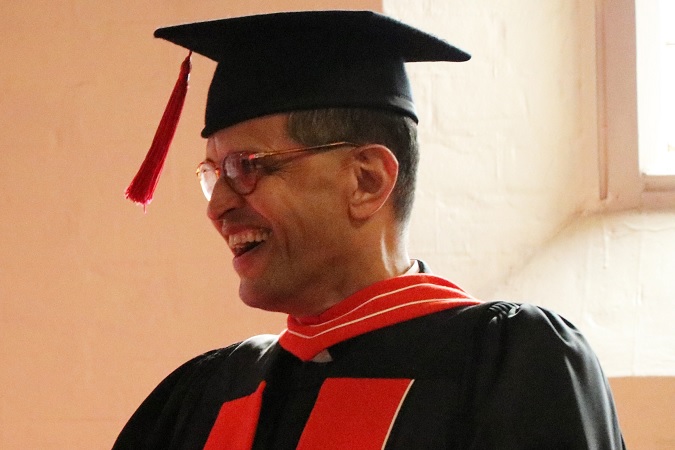CCSTA is saddened to hear of the passing a great promoter and leader of Catholic education, Fr. Mario D’Souza.
A member of the Faculty of Theology at the University of Toronto, Fr. D’Souza made a wide and deep contribution to Catholic education, in particular to its philosophical underpinnings in contemporary culture.
Fr. D’Souza was born in Karachi, Pakistan, in 1956, and moved to Canada as a young adult. He was ordained to the priesthood in 1991, celebrating his 25th anniversary of ordination last year. He began teaching at St. Michael’s Faculty of Theology in 1991, and, other than his time at Assumption (Jan., 2005-Aug., 2006), the Faculty remained his home until his death. He held the Basilian Fathers Chair in Religion and Education, and was named a Fellow of St. Michael’s College in October of 2014. He served as Dean of the Faculty of Theology from 2009 to 2014.
He died peacefully at the Cardinal Flahiff Basilian Centre on Sept. 26 after a brief illness.
The University of St. Michael’s College paid tribute to Fr. D’Souza after his passing.
He brought to the classroom a rich academic history of his own, having received degrees from Boston College, the University of St. Michael’s College, the University of Toronto, the University of Calgary, and University College, Dublin,” the university wrote. “Loved by his colleagues, his friends, and, most importantly, his students, Fr. Mario will be deeply missed.”
Just last year, Fr. D’Souza released his latest book, A Catholic Philosophy of Education. The Church and Two Philosophers (McGill-Queen’s University Press. 2016).
The two philosophers Fr. D’Souza draws on are the neo-Thomist Jacques Maritain and the Jesuit Bernard Lonergan, while “The Church” refers to the various documents on education issued by Rome in a time range of prior to, during and following Vatican Council II.
Fr. D’Souza writes: “My interest has been to explore the universal themes and challenges of a Catholic philosophy of education: human flourishing and the subject as developing in relation to the good, as Lonergan sees it; the role of Catholic education in the heuristic discovery of the common good, as Maritain envisioned; and how the tremendous advances in working for human unity, liberation, and freedom are also beset with dangers leading to the diminishment of the student as a person, as laid out in the Church’s educational documents” (218).
Dr. Bonaventure Fagan of Newfoundland outlines how Fr. D’Souza’s book was on his Catholic education summer reading list.
“The result is a work that is bound to stir within the reader a deeper appreciation of the underlying roots and essence of Catholic education, the contemporary challenges it faces, and a holistic vision of how our youth can best serve our Creator and the diverse human community,” says Dr. Fagan. “A Catholic Philosophy of Education… gives us an insight into Fr. D’Souza’s broad contribution to Catholic education. In the classroom and in his many scholarly articles, he reflected on and argued for a more precise understanding of what constitutes Catholic education in the contemporary world. He respected those who articulated a contrary position. In Toronto and elsewhere teachers who studied with him must have marvelled at his wisdom – he pointed out how much he learned from them, for education, he said, is never a solitary exploration. In short, Mario D’Souza will be sorely missed by the university community, by the Catholic education community, and most dearly by his Basilian community.”
A funeral mass was held for Dr. D’Souza on Sept. 30, 2017.
Categories:


Leave a comment